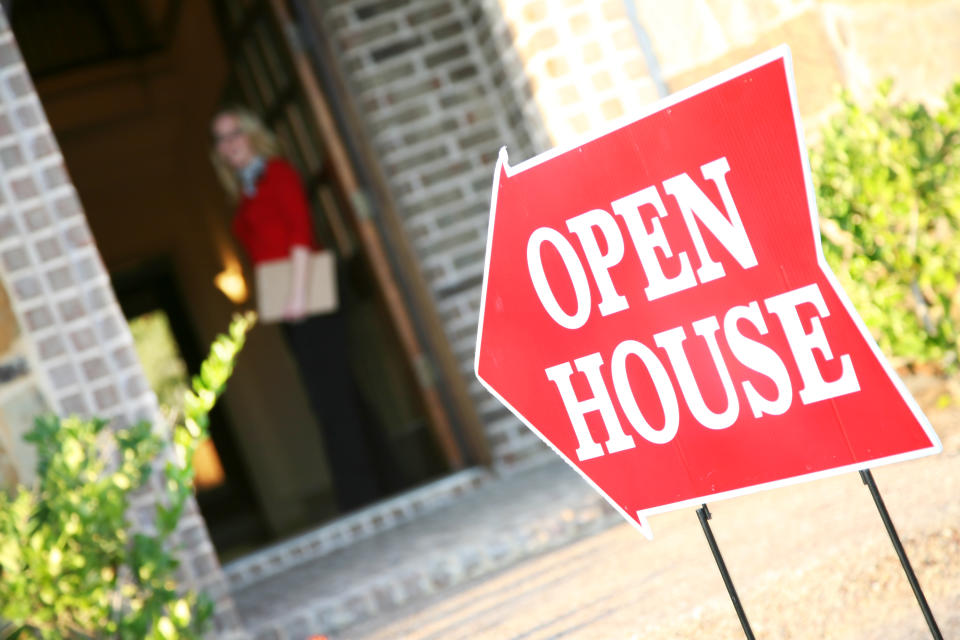Expert: Coronavirus starting to scare away homebuyers and sellers
Coronavirus fears will depress house sales this spring, one expert predicted, with some jittery buyers and sellers changing their plans as the traditional home-buying season gets underway.
Almost 1 in 6 real estate agents nationwide said buyer interest had declined because of concerns over the illness, according to a flash survey from the National Association of Realtors released on Thursday, while 1 in 10 said the number of sellers putting their homes on the market decreased.
The survey is based on 2,518 responses from realtors nationwide.
Read more: Buying a home: Everything you need to know
The decline in activity will cut home sales by 10%, NAR Chief Economist Lawrence Yun said, and later specifying to Yahoo Money that the reduction will come in March and April, when housing activity normally heats up.
“Given that a home transaction is a major commitment, the uncertainties on how the economy will play out and the spread of the virus itself are barriers to home-buying and selling,” Yun said in a statement. “The stock market crash is no doubt raising economic anxieties, while the coronavirus brings fear of contact with strangers.”
But the sales reduction won’t be enough to counterbalance ongoing price hikes due to inventory shortages, Yun told Yahoo Money.

Real estate, and coronavirus fears, are local
The ripple effect from coronavirus is affecting some markets more than others. In Seattle, where the first U.S. coronavirus death was confirmed on Saturday, Feb. 29, open houses dipped at the end of February, according to the most recent data available from Redfin.
The NAR survey found that 1 in 5 agents that buyer interest waned in Washington, more than the national numbers, and more than 1 in 7 agents said the number of homes on the market declined.
Read more: How to sell your house: The basics
Currently there are 116 confirmed cases in King’s county in Washington, in which Seattle is located.
“It’s definitely been an interesting quick change up here. It was the busiest in January and February that we’ve seen in a long time,” Shoshana Godwin, a Redfin agent in Seattle, said. “But we have seen some hesitation from buyers in the past week. And that can come from the virus itself or what it’s doing to the stock market.”

‘A bottle of hand sanitizer next to the sign-up sheet’
Open houses in New York City, where there have been at least 62 confirmed cases of coronavirus, have also dropped.
The average for the city was 4.1 visitors per open house the weekend of March 7, down 14% from the prior weekend’s average of 4.77 and down 27% from the weekend of Feb. 23 when the average visitors per open house was 5.62, according to data by Halstead Real Estate, and New York-based brokerage.
Anecdotally, some New York buyers and sellers are showing signs that they’re concerned. Some agents report that buyers at open houses are hesitant to use iPads to sign in at open houses.
Read more: When to sell your home
“My guess is that most open houses going forward will have a bottle of hand sanitizer next to the sign-up sheet,” said Lindsay Barton Barrett, an agent at New York City-based brokerage Douglas Elliman, who also advised one seller to not cancel their open house because it could harm the sale process.
That echoed other findings from the NAR survey.
Nationwide, about 1 in 4 agents said their sellers are stopping open houses, requiring buyers to wash hands or use hand sanitizer, and requesting buyers to remove their shoes before entering. In California, 1 in 3 agents are reporting this, while 44% of agents said sellers are requesting this in Washington.
‘A self-fulfilling prophecy’
Potential homebuyers have economic concerns as well, as the coronavirus sends stocks spiraling and has shut down most economic activity in the hardest-hit countries overseas.
“Coronavirus could send the U.S. into a recession potentially,” said Redfin Chief Economist Daryl Fairweather. “And that would be a hit to the housing market.”

Nearly three-quarters of Americans worry that the next recession could impact them personally, according to a Nerdwallet survey, with 1 in 7 concerned they could lose their job.
“There’s also a fear of job loss and people will not buy if they’re worried about their job,” said Scott Sheldon, branch manager at New American funding. “The thing that drives homeownership is income.”
Even though recent job numbers appear promising, with nonfarm jobs increasing by more 273,000 jobs in February, experts said the numbers don’t reflect what’s occurring now.
“In real economic data, we had a good job number Friday, but these numbers are trailing not leading,” said Kevin Leibowitz, president of Grayton Mortgage Inc. “What happens in these situations where people fear is a self-fulfilling prophecy.”
‘A lot of opportunistic shoppers’
Some buyers may find opportunity amid the uncertainty, as historically low mortgage rates increase affordability. More than a third of brokers nationwide said their buyers were excited by the low rates, according to the NAR flash survey.
Mortgage rates fell to a 50-year low of 3.29% in the first week in March, according to the Mortgage Bankers Association, and ticked up to 3.36% this week.

The MBA expects rates to remain between 3.3% and 3.4% for the rest of the year, which should help should prop up housing demand for the next three to 12 months, said Javier Vivas, director of economic research at Realtor.com, in a recent report.
“If all other variables stay the same, the impact to housing could be palpable and momentarily disruptive,” he wrote, “but less likely to be long-lasting at a national level.”
Read more: How to get the best mortgage deal
It also helps prospective buyers that the majority of sellers — about 88%, according to the NAR are not changing their listings. Even in California and Washington 66% and 56% of sellers will make no changes.
“There are a lot of opportunistic shoppers, too,” said Ali Wolf, director of economic research at Meyers Research LLC. “There are people on the sidelines thinking, ‘Home prices may eventually come down,’ and they have money saved for that day — particularly millennials.”
Dhara Singh and Sarah Paynter are reporters at Cashay and Yahoo Finance. Follow them on Twitter at @Dsinghx and @sarahapaynter.
Read more:
Mortgage refinances hit 11-year high as coronavirus fears send rates tumbling
Google search for ‘Should I buy a house’ is at all-time high
Read the latest financial and business news from Yahoo Finance and Yahoo Money
Follow Yahoo Finance on Twitter, Facebook, Instagram, Flipboard, SmartNews, LinkedIn, YouTube, and reddit.

 money
money 